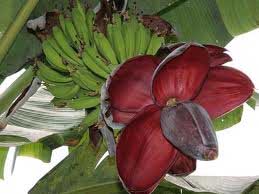Banana Klutuk (Musa balbisiana Colla)
Stone banana is a banana species that still has seeds. Its cross with Musa acuminata is edible. The name stone banana is given because it contains seeds, so when consumed it makes a clicking sound as if it were chewing a stone.

Botany
Synonym: Musa acuminata
Classification
Kingdom : Plantae – Plants
Subkingdom : Tracheobionta
Superdivision : Spermatophyta
Division : Magnoliophyta
Class : Liliopsida
Nation : Zingiberales
Tribe : Musaceae
Surname : Musa
Type : Musa balbisiana Colla
Name
English : banana
Indonesia : rock banana, seed banana
Javanese : gedang klutuk (Javanese), cau rajamanggala (Sundanese)
Description
Pseudo-trunked banana plants (visible above the ground) can reach ± 3 m high. Above the pseudo stem there are many leaves clustered with leaf sheaths 1 – 2 m. Leaves tear easily. Inflorescence comes out from the end of the stem, near the leaves in the form of bunches, the color of the flowers is white. The fruit is also in the form of bunches after ripe yellow. Banana seeds taste sweet but have lots of seeds, 1 fruit has ± 50 seeds, small seeds, black color (like kapok seeds)
Distribution/Distribution: Found throughout Indonesia, especially on forest edges, cliff edges around Jember (East Java).

Habitat : Grows in the lowlands to an altitude of ± 2200 m above sea level. Banana plants like hot, fertile or slightly rocky areas, near garbage disposals.
Benefits of plants: Klutuk banana fruit is used as an auxiliary material to produce color, strengthen the resistance of colors derived from natural dyes.
Benefits of plants in an emergency: Banana klutuk fruit is used as a food ingredient, flowers can be boiled and or burned for food, stump (stem stalks) can be used for food after boiling several times and removing the water, leaves can be used for roofing bivoac. The stems can be squeezed to take the water for drinking after it has been settled and cooked/filtered. Banana weevils after being cut and hollowed out can be used to get drinking water.